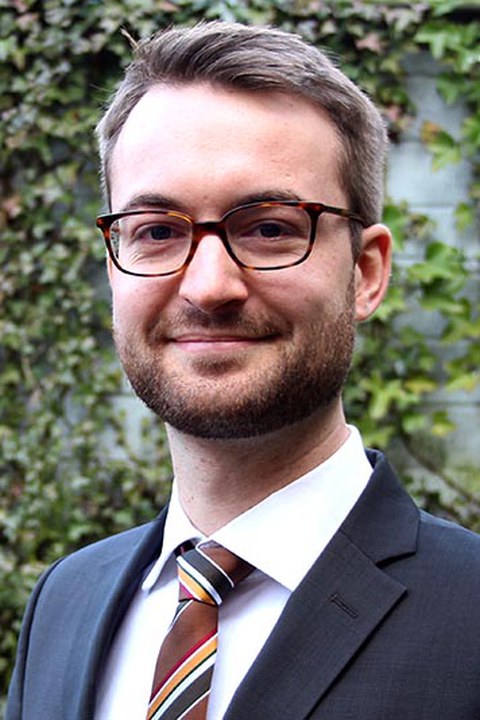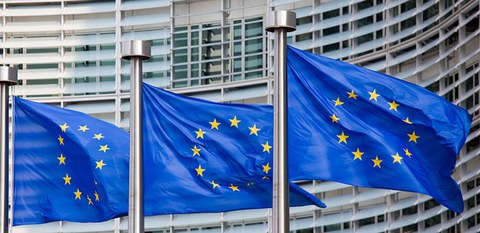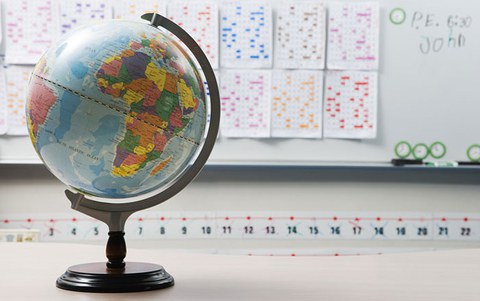Vom Unwahrscheinlichen auf die richtige Straße nach Belgien
(porträtiert im Jahr 2022)
Dagmar Möbius
Benedikt Wiedenhofer ist der erste Akademiker in seiner Familie. Nach dem Bachelor-Studium der Europastudien in Bayern kam er an die TU Dresden, um seinen Master für Internationale Beziehungen zu absolvieren. Seit 2018 arbeitet der heute 30-Jährige in Brüssel als Referent für Handelspolitik beim europäischen Arbeitgeberverband BusinessEurope.

Benedikt Wiedenhofer
Bei Abi-Durchschnittsnote 1,7 wusste Benedikt Wiedenhofer lange nicht, was er beruflich werden will. Der gebürtige Bad Tölzer interessierte sich für Sprachen, Geschichte und andere Kulturen, besuchte den Leistungskurs Englisch und Latein. „Dolmetscher war mir aber zu festgelegt“, sagt er. Eine Freundin brachte ihn auf den Studiengang Europastudien an der Katholischen Universität Eichstätt-Ingolstadt. „Eine Studienberaterin sagte zu mir, daraus kann man viel machen – muss man aber auch. Sie hatte Recht. Mein Studium ab 2011 war sehr breit gefächert: von Sprachen, Literatur, Kunstgeschichte über BWL und VWL bis zu interkultureller Kommunikation“, erzählt Benedikt Wiedenhofer. „Orientierungswissen“ fasst er zusammen und gibt zu: „Obwohl die Uni und die Betreuung super waren, fragte ich mich schon im zweiten Semester, was aus uns werden soll.“
Politikwissenschaft und Volkswirtschaftslehre interessierten ihn besonders. Er belegte zahlreiche Zusatzkurse. „Für viele Master braucht man 60 ECTSs in der jeweiligen Disziplin“, war nur ein Grund. Mit dem Bachelor absolvierte Benedikt Wiedenhofer bis 2015 ein Jahr Praktika im Siemens EU- Verbindungsbüro Brüssel und in der Deutschen Botschaft in Dublin. Sein Masterstudium sollte spezialisierter sein. „So kam ich auf den M.A.-Studiengang Internationale Beziehungen an der TU Dresden. Die Möglichkeit sich vor Beginn entweder auf internationale Wirtschaft oder internationales Recht zu festzulegen, machte ihn relativ einzigartig in Deutschland“, erzählt er. Ostdeutschland kannte der damals 25-Jährige nur von einer Klassenfahrt nach Berlin. „Es hat mich gereizt, nach meinen Auslandsaufenthalten auch das eigene Land besser kennenzulernen“, begründet er seine Motivation. Nach einem Auswahlgespräch war er einer von zweimal je 15 Studierenden pro Spezialisierung Internationale Organisationen und Globale politische Ökonomie.
Das anspruchsvolle Studium verlangte ihm einiges ab: „Ich musste vieles selbstständig nachholen.“ Statistik, politikwissenschaftliche Theorien, Empirik. Benedikt Wiedenhofer lobt die sehr gut ausgestattete Universität und den sehr kompetenten Lehrstuhl. „Dresden war auch super für das Studentenleben“, lacht er und verbindet seine Zeit in der Stadt mit dem Konsum eines Mate-Getränkes. Die Kurse von Dr. Sebastian Lange begeisterten ihn wegen vieler spannender Hintergrundinformationen. „Die volkswirtschaftlichen Vorlesungen von Prof. Dr. Kreickemeier waren sehr anspruchsvoll, man lernte dadurch aber auch viel. Dr. Markus Gastinger war sehr streng bei der Methodologie, aber dadurch hat er mir sehr geholfen und mich bezüglich Themenfindung und Methodik meiner Masterarbeit auf die richtige Straße gelotst“, erinnert sich Benedikt Wiedenhofer.
Er beschäftigte sich mit handelspolitischen Trends der letzten 20 Jahre, speziell mit der Frage, inwiefern die Europäische Union fähig war, die sogenannten Singapur-Themen in bilateralen Handelsabkommen mit Entwicklungsländern durchzusetzen. Das Thema seiner Masterarbeit verhalf ihm auch zu seinem Praktikum im Sekretariat des EU-Parlaments in Brüssel, das er von Oktober 2017 bis Ende Februar 2018 absolvierte. Währenddessen wurde eine Stelle beim europäischen Arbeitgeberverband BusinessEurope frei. „Die Stellenausschreibung passte perfekt“, lacht er und bewarb sich. Seine Einstellung funktionierte nahtlos: „Am Freitag verteidigte ich meine Masterarbeit, am Montag darauf unterschrieb ich meinen Arbeitsvertrag.“
Seit Februar 2018 arbeitet Benedikt Wiedenhofer als Referent für Handelspolitik beim europäischen Arbeitgeberverband BusinessEurope in Brüssel. Das Team der Abteilung Internationale Beziehungen, in der er tätig ist, besteht aus sechs Mitarbeitenden, vier davon sind Referentinnen und Referenten. Die Zuständigkeiten sind einmal geografisch und einmal thematisch festgelegt. Benedikt Wiedenhofer ist für EU-Beziehungen mit China, dem Vereinigten Königreich, Afrika, der Andengemeinschaft und der Karibik verantwortlich. Zudem verfolgt er die Themen EU-Entwicklungspolitik und die Implementierung von EU-Handelsabkommen. Aktuell beschäftigt er sich beispielsweise damit, wie mehr private Investitionen in Entwicklungsländer gebracht werden können oder wie sich ausländische Subventionen regulieren lassen. Ein anderes konkretes Beispiel seiner Arbeit ist auch der seit März 2021 bestehende Sanktionsaustausch zwischen der EU und China. „Seitdem liegt das EU-China-Investitionsabkommen auf Eis“, erklärt Benedikt Wiedenhofer, „China bleibt trotzdem ein wichtiger EU-Handelspartner.“I
In seiner Tätigkeit liest er relevante Nachrichten, Berichte und Studien, schreibt, Artikel, Briefe, Positionspapiere und Reden. Er organisiert Konferenzen, Seminare und Webinare, verwaltet Arbeitsgruppen und tauscht sich mit Vertreterinnen und Vertretern von Mitgliedsverbänden, Unternehmen, EU-Institutionen, internationalen Organisationen, Nichtregierungsorganisationen und Staaten aus. „Manches Thema klingt für Außenstehende trocken“, weiß Benedikt Wiedenhofer, „aber es ist sehr spannend, wenn man mitten drin ist, wenn es um die Megatrends der nächsten 20, 30 Jahre geht.“
Er hat seine berufliche Bestimmung gefunden und möchte in Brüssel bleiben. „Hätte mir jemand beim Abitur gesagt, wo ich heute arbeite, hätte ich das für unwahrscheinlich gehalten“, lacht er. „Über internationale Beziehungen findet man unterwegs viel heraus. Man darf nicht aufgeben, man lernt viel auf dem Weg und kann sich spezialisieren.“
In seiner Freizeit bleibt es bei Benedikt Wiedenhofer international: Er kocht gern indisch.
Zusatz der Redaktion:
Benedikt Wiedenhofer war nach einer Anfrage des TUD-Schülermentorings sofort bereit, als Interviewpartner beim „Profiverhör“ interessierten Schülerinnen und Schülern Rede und Antwort zu stehen. Sie sollen durch dieses Projekt auf die Herausforderungen des Studiums wie auch des Berufsfeldes, bezogen auf jeweils bestimmte Studiengänge, aufmerksam gemacht werden. Mit dabei war auch Ianina Scheuch. Fazit beider Seiten: Ein stimmiges Format und gerne wieder.
Kontakt:
Benedikt Wiedenhofer
E-Mail
TUD-Filmclip zum Studium der Internationalen Beziehungen:


